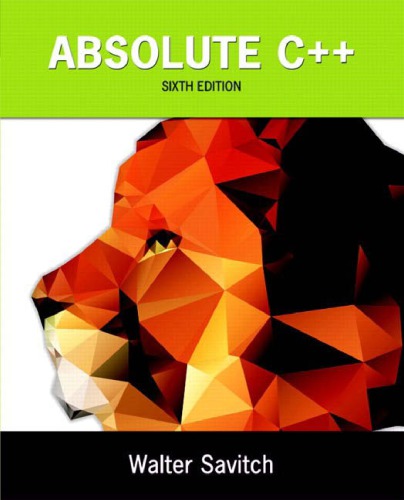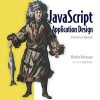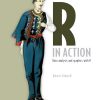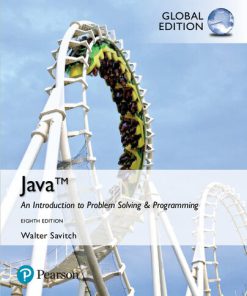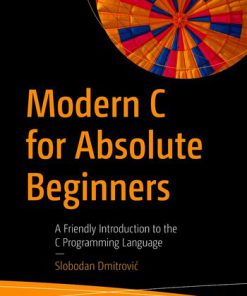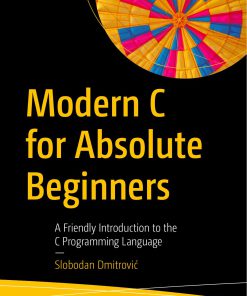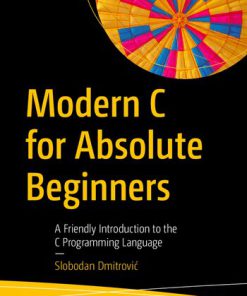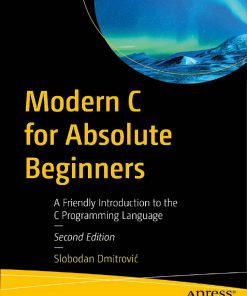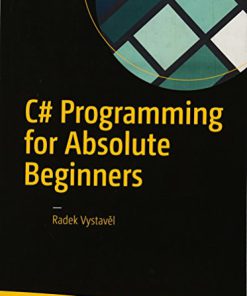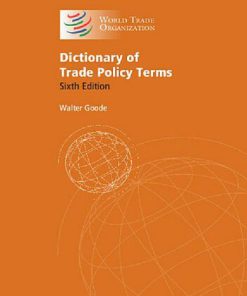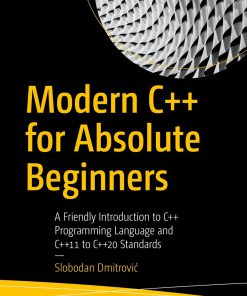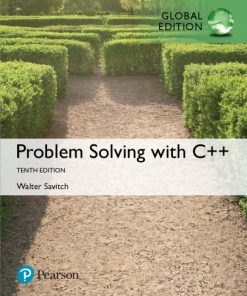Absolute C 6th Edition by Walter Savitch, Kenrick Mock ISBN 0133970949 9780133970944
$50.00 Original price was: $50.00.$25.00Current price is: $25.00.
Absolute C++ 6th Edition by Walter Savitch, Kenrick Mock – Ebook PDF Instant Download/Delivery: 0133970949, 9780133970944
Full download Absolute C++ 6th Edition after payment
Product details:
ISBN 10: 0133970949
ISBN 13: 9780133970944
Author: Walter Savitch, Kenrick Mock
Introduction and Advancement in C++ Programming Absolute C++ is a comprehensive introduction to the C++ programming language. The text is organized around the specific use of C++, providing programmers with an opportunity to master the language completely. Adaptable to a wide range of users, the text is appropriate for beginner to advanced programmers familiar with the C++ language. The Sixth Edition covers everything from basic syntax to more advanced topics, such as polymorphism, exception handling, and the Standard Template Library, making it ideal for both beginner and intermediate programmers. Updated to reflect the most recent changes in the C++ language, Absolute C++ teaches readers to become proficient in a widely used and important programming language.
Absolute C++ 6th Table of contents:
1 C++ Basics
Introduction
1.1 Introduction to C++
Origins of the C++ Language
C++ and Object-Oriented Programming
The Character of C++
C++ Terminology
A Sample C++ Program
1.2 Variables, Expressions, and Assignment Statements
Identifiers
Variables
Assignment Statements
Introduction to the string class
More Assignment Statements
Self-Test Exercises
Assignment Compatibility
Literals
Escape Sequences
Raw String Literals
Naming Constants
Arithmetic Operators and Expressions
Integer and Floating-Point Division
Self-Test Exercises
Type Casting
Increment and Decrement Operators
1.3 Console Input/Output
Output Using cout
New Lines in Output
Formatting for Numbers with a Decimal Point
Output with cerr
Input Using cin
Self-Test Exercises
1.4 Program Style
Comments
1.5 Libraries and Namespaces
Libraries and include Directives
Namespaces
Chapter Summary
Answers to Self-Test Exercises
Programming Projects
2 Flow of Control
Introduction
2.1 Boolean Expressions
Building Boolean Expressions
Evaluating Boolean Expressions
Precedence Rules
Self-Test Exercises
2.2 Branching Mechanisms
if-else Statements
Compound Statements
Self-Test Exercises
Omitting the else
Nested Statements
Multiway if-else Statement
The switch Statement
Self-Test Exercises
Enumeration Types
The Conditional Operator
Self-Test Exercises
2.3 Loops
The while and do-while Statements
Increment and Decrement Operators Revisited
Self-Test Exercises
The Comma Operator
The for Statement
Self-Test Exercises
The break and continue Statements
Nested Loops
Self-Test Exercises
2.4 Introduction to File Input
Reading From a Text File Using ifstream
Self-Test Exercises
Chapter Summary
Answers to Self-Test Exercises
Programming Projects
3 Function Basics
Introduction
3.1 Predefined Functions
Predefined Functions That Return a Value
Predefined void Functions
Self-Test Exercises
A Random Number Generator
Self-Test Exercises
3.2 Programmer-Defined Functions
Defining Functions That Return a Value
Alternate Form for Function Declarations
Functions Calling Functions
Self-Test Exercises
Functions That Return a Boolean Value
Self-Test Exercises
Defining void Functions
return Statements in void Functions
Preconditions and Postconditions
main Is a Function
Recursive Functions
Self-Test Exercises
3.3 Scope Rules
Local Variables
Procedural Abstraction
Global Constants and Global Variables
Self-Test Exercises
Blocks
Nested Scopes
Variables Declared in a for Loop
Self-Test Exercise
Chapter Summary
Answers to Self-Test Exercises
Programming Projects
4 Parameters and Overloading
Introduction
4.1 Parameters
Call-by-Value Parameters
Self-Test Exercises
A First Look at Call-by-Reference Parameters
Call-by-Reference Mechanism in Detail
Constant Reference Parameters
Self-Test Exercises
Mixed Parameter Lists
Self-Test Exercises
4.2 Overloading and Default Arguments
Introduction to Overloading
Self-Test Exercises
Rules for Resolving Overloading
Default Arguments
Self-Test Exercise
4.3 Testing and Debugging Functions
The assert Macro
Stubs and Drivers
Self-Test Exercises
Chapter Summary
Answers to Self-Test Exercises
Programming Projects
5 Arrays
Introduction
5.1 Introduction to Arrays
Declaring and Referencing Arrays
Arrays in Memory
The Range-Based for Loop
Initializing Arrays
Self-Test Exercises
5.2 Arrays in Functions
Indexed Variables as Function Arguments
Self-Test Exercises
Entire Arrays as Function Arguments
The const Parameter Modifier
Functions That Return an Array
Self-Test Exercises
5.3 Programming with Arrays
Partially Filled Arrays
Self-Test Exercises
5.4 Multidimensional Arrays
Multidimensional Array Basics
Multidimensional Array Parameters
Self-Test Exercises
Chapter Summary
Answers to Self-Test Exercises
Programming Projects
6 Structures and Classes
Introduction
6.1 Structures
Structure Types
Structures as Function Arguments
Initializing Structures
Self-Test Exercises
6.2 Classes
Defining Classes and Member Functions
Self-Test Exercises
Encapsulation
Public and Private Members
Accessor and Mutator Functions
Self-Test Exercises
Structures versus Classes
Self-Test Exercises
Chapter Summary
Answers to Self-Test Exercises
Programming Projects
7 Constructors and Other Tools
Introduction
7.1 Constructors
Constructor Definitions
Explicit Constructor Calls
Self-Test Exercises
Self-Test Exercises
Class Type Member Variables
Member Initializers and Constructor Delegation in C++11
7.2 More Tools
The const Parameter Modifier
Self-Test Exercises
Inline Functions
Self-Test Exercise
Static Members
Self-Test Exercise
Nested and Local Class Definitions
7.3 Vectors—A Preview of the Standard Template Library
Vector Basics
Efficiency Issues
Self-Test Exercises
Chapter Summary
Answers to Self-Test Exercises
Programming Projects
8 Operator Overloading, Friends, and References
Introduction
8.1 Basic Operator Overloading
Overloading Basics
Self-Test Exercises
Returning by const Value
Self-Test Exercise
Overloading Unary Operators
Overloading as Member Functions
Self-Test Exercise
Overloading Function Application ( )
8.2 Friend Functions and Automatic Type Conversion
Constructors for Automatic Type Conversion
Friend Functions
Friend Classes
Self-Test Exercises
8.3 References and More Overloaded Operators
References
Overloading >> and <<
Self-Test Exercises
The Assignment Operator
Overloading the Increment and Decrement Operators
Self-Test Exercise
Overloading the Array Operator [ ]Overloading Based on L-Value versus R-Value
Chapter Summary
Answers to Self-Test Exercises
Programming Projects
9 Strings
Introduction
9.1 An Array Type for Strings
C-String Values and C-String Variables
Other Functions in
Self-Test Exercises
C-String Input and Output
Self-Test Exercises
9.2 Character Manipulation Tools
Character I/O
The Member Functions get and put
The putback , peek , and ignore Member Functions
Self-Test Exercises
Character-Manipulating Functions
Self-Test Exercises
9.3 The Standard Class string
Introduction to the Standard Class string
I/O with the Class string
Self-Test Exercises
String Processing with the Class string
Self-Test Exercises
Converting Between string Objects and C-Strings
Converting Between string Objects and Numbers
Chapter Summary
Answers to Self-Test Exercises
Programming Projects
10 Pointers and Dynamic Arrays
Introduction
10.1 Pointers
Pointer Variables
Self-Test Exercises
Basic Memory Management
nullptr
Dynamic Variables and Automatic Variables
Self-Test Exercises
Uses for Pointers
10.2 Dynamic Arrays
Array Variables and Pointer Variables
Creating and Using Dynamic Arrays
Self-Test Exercises
Pointer Arithmetic
Multidimensional Dynamic Arrays
10.3 Classes, Pointers, and Dynamic Arrays
The -> Operator
The this Pointer
Overloading the Assignment Operator
Destructors
Copy Constructors
Self-Test Exercises
Chapter Summary
Answers to Self-Test Exercises
Programming Projects
11 Separate Compilation and Namespaces
Introduction
11.1 Separate Compilation
Encapsulation Reviewed
Header Files and Implementation Files
Using #ifndef
Self-Test Exercises
11.2 Namespaces
Namespaces and using Directives
Creating a Namespace
Self-Test Exercises
using Declarations
Qualifying Names
Self-Test Exercises
Unnamed Namespaces
Nested Namespaces
Self-Test Exercises
Chapter Summary
Answers to Self-Test Exercises
Programming Projects
12 Streams and File I/O
Introduction
12.1 I/O Streams
File I/O
Appending to a File
Self-Test Exercises
Character I/O
Checking for the End of a File
Self-Test Exercises
12.2 Tools for Stream I/O
File Names as Input
Formatting Output with Stream Functions
Manipulators
Saving Flag Settings
More Output Stream Member Functions
Self-Test Exercises
12.3 Stream Hierarchies: A Preview of Inheritance
Inheritance among Stream Classes
Self-Test Exercises
Parsing Strings with the stringstream Class
Self-Test Exercises
12.4 Random Access to Files
Chapter Summary
Answers to Self-Test Exercises
Programming Projects
13 Recursion
Introduction
13.1 Recursive void Functions
Tracing a Recursive Call
A Closer Look at Recursion
Self-Test Exercises
Stacks for Recursion
Recursion versus Iteration
Self-Test Exercises
13.2 Recursive Functions That Return a Value
General Form for a Recursive Function That Returns a Value
Self-Test Exercises
Mutual Recursion
Self-Test Exercises
13.3 Thinking Recursively
Recursive Design Techniques
Binary Search
Coding
Checking the Recursion
Efficiency
Self-Test Exercises
Chapter Summary
Answers to Self-Test Exercises
Programming Projects
14 Inheritance
Introduction
14.1 Inheritance Basics
Derived Classes
Constructors in Derived Classes
The protected Qualifier
Self-Test Exercises
Redefinition of Member Functions
Redefining versus Overloading
Access to a Redefined Base Function
Functions That Are Not Inherited
Self-Test Exercises
14.2 Programming with Inheritance
Assignment Operators and Copy Constructors in Derived Classes
Destructors in Derived Classes
Self-Test Exercises
Self-Test Exercises
Protected and Private Inheritance
Multiple Inheritance
Chapter Summary
Answers to Self-Test Exercises
Programming Projects
15 Polymorphism and Virtual Functions
Introduction
15.1 Virtual Function Basics
Late Binding
Virtual Functions in C++
Provide Context with C++11’s override Keyword
Preventing a Virtual Function from Being Overridden
Self-Test Exercises
Abstract Classes and Pure Virtual Functions
Self-Test Exercises
15.2 Pointers and Virtual Functions
Virtual Functions and Extended Type Compatibility
Self-Test Exercises
Downcasting and Upcasting
How C++ Implements Virtual Functions
Self-Test Exercise
Chapter Summary
Answers to Self-Test Exercises
Programming Projects
16 Templates
Introduction
16.1 Function Templates
Syntax for Function Templates
Self-Test Exercises
Self-Test Exercises
16.2 Class Templates
Syntax for Class Templates
Self-Test Exercises
Self-Test Exercise
The vector and basic_string Templates
16.3 Templates and Inheritance
Self-Test Exercises
Chapter Summary
Answers to Self-Test Exercises
Programming Projects
17 Linked Data Structures
Introduction
17.1 Nodes and Linked Lists
Nodes
Self-Test Exercises
Linked Lists
Inserting a Node at the Head of a List
Inserting and Removing Nodes Inside a List
Searching a Linked List
Pseudocode for search Function
Doubly Linked Lists
Adding a Node to a Doubly Linked List
Deleting a Node from a Doubly Linked List
Self-Test Exercises
17.2 Linked List Applications
Self-Test Exercises
Self-Test Exercises
Friend Classes and Similar Alternatives
A Hash Function for Strings
Efficiency of Hash Tables
Self-Test Exercises
Fundamental Set Operations
Efficiency of Sets Using Linked Lists
Self-Test Exercise
17.3 Iterators
Pointers as Iterators
Iterator Classes
Self-Test Exercise
17.4 Trees
Tree Properties
Self-Test Exercise
Chapter Summary
Answers to Self-Test Exercises
Programming Projects
18 Exception Handling
Introduction
18.1 Exception Handling Basics
A Toy Example of Exception Handling
Self-Test Exercises
Defining Your Own Exception Classes
Multiple Throws and Catches
Throwing an Exception in a Function
Exception Specification
Self-Test Exercises
18.2 Programming Techniques for Exception Handling
When to Throw an Exception
Exception Class Hierarchies
Testing for Available Memory
Rethrowing an Exception
Self-Test Exercises
Chapter Summary
Answers to Self-Test Exercises
Programming Projects
19 Standard Template Library
Introduction
19.1 Iterators
Iterator Basics
Self-Test Exercises
Kinds of Iterators
Self-Test Exercise
Constant and Mutable Iterators
Reverse Iterators
Other Kinds of Iterators
Self-Test Exercises
19.2 Containers
Sequential Containers
Self-Test Exercises
The Container Adapters stack and queue
Self-Test Exercises
The Associative Containers set and map
Efficiency
Self-Test Exercises
19.3 Generic Algorithms
Running Times and Big-O Notation
Container Access Running Times
Self-Test Exercises
Nonmodifying Sequence Algorithms
Self-Test Exercises
Modifying Sequence Algorithms
Self-Test Exercises
Set Algorithms
Self-Test Exercise
Sorting Algorithms
Chapter Summary
Answers to Self-Test Exercises
Programming Projects
20 Patterns and UML
Introduction
20.1 Patterns
Adapter Pattern
The Model-View-Controller Pattern
Efficiency of the Sorting Pattern
Pattern Formalism
Self-Test Exercises
20.2 UML
History of UML
UML Class Diagrams
Class Interactions
Self-Test Exercises
Chapter Summary
Answers to Self-Test Exercises
Programming Projects
1 C++ Keywords
2 Precedence of Operators
3 The ASCII Character Set
4 Some Library Functions
Arithmetic Functions
Input and Output Member Functions
Character Functions
C-String Functions
string Class Functions
Random Number Generator
Trigonometric Functions
5 Old and New Header Files
6 Additional C++11 Language Features
People also search for Absolute C++ 6th:
absolute c 6th
absolute c ++ 6th edition by walter savitch
absolute number in c
absolute value of 6
absolute c++ 6th edition
Tags:
Walter Savitch,Kenrick Mock,Absolute
You may also like…
Computers - Programming
Computers - Programming
Modern C for Absolute Beginners 1st Edition Slobodan Dmitrovic
Computers - Programming
Computers - Programming
Modern C for Absolute Beginners – Second Edition Solbodan Dmitrovic
Computers - Programming
Jurisprudence & Law - Foreign & International Law
Computers - Programming
Modern C++ for Absolute Beginners 1st Edition Slobodan Dmitrović [Dmitrović
Computers - Programming


